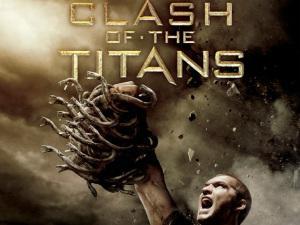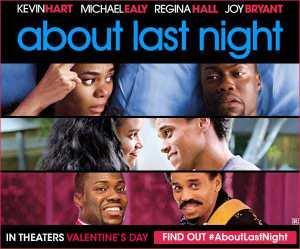Novelist and walking encyclopedia of film knowledge Kim Newman has described Hollywood’s cyclical copycat crazes as metaphorically beginning with one film which unexpectedly starts a ripple in the ocean to which producers everywhere all flock like surfers seeking to ride out the next big wave.
So, what ripples in the ocean of film production resulted in three of the four new wide releases this past weekend being remakes of 1980s movie -About Last Night, Endless Love, RoboCop? In fact, while three such remakes opening at the same time is the new high water mark 1980s remakes actually opened opposite of each other on two separate weekends in 2011 (Conan the Barbarian vs. Fright Night in August; Footloose vs. The Thing in October). Altogether, there have been at least 19 widely released 1980s remakes in the past 7 years, 22 if you go back to 2003. That’s not counting the 4 major 1980s TV shows (21 Jump Street, Dukes of Hazard, The A-Team, and Miami Vice) that were adapted, or various remakes which more or less went straight to home video (e.g., April Fools Day, Maniac, Mother’s Day, Night of the Demons, Silent Night).

Alex Pettyfer and Gabrielle Wilde in the new Endless Love remake, quite possibly one of the most puzzling remakes in recent memory.
That sure sounds like a lot, but the ’80s is most certainly not the only decade being pilfered [see: Dredd, Total Recall from the '90s]. Moreover, Hollywood has long since been entrenched in favoring remakes, sequels, and adaptations over original properties as a way of at least theoretically guaranteeing a built-in audience. In fact, there isn’t a single wide release planned for March which isn’t either a sequel or adaptation (literary/video game). So, while the topic this week is ’80s remakes last week it was YA novel adaptations after the historic failure of Vampire Academy, and later on in the year it will be comic book adaptations after Captain America: Winter Soldier, Amazing Spider-Man 2, and Guardians of the Galaxy. However, the ’80s remakes have more in common with the YA adaptations than comic book films in that very few have actually turned into huge box office hits.
Not counting Endless Love, About Last Night, and RoboCop since they are still in theaters, here are the top 19 box office earners among the 1980s remakes, sorted by worldwide gross. Keep in mind while looking at this list that studios have to split a film’s gross roughly 50/50 with the theaters meaning you should divide each worldwide gross by 2 and then compare the result to budget to see if a movie actually made any money for its studio (none of the following figures have been adjusted for ticket price inflation):

1. Clash of the Titans (2010) -
- $125 million budget – $163/$493 million domestic/worldwide
- $51 million domestic home video sales
2. The Karate Kid (2010) -
- $40 million budget – $176/$359 million domestic/worldwide
- $52 million domestic home video sales
3. A Nightmare on Elm Street (2010) -
- $35 million budget – $63/$115 million domestic/worldwide
- $12 million domestic home video sales
4. My Bloody Valentine (2009) -
- $15 million budget - $51/$100 million domestic/worldwide
- $21 million domestic home video sales
5. Evil Dead (2013) -
- $17 million budget – $54/$97 million domestic/worldwide
- $11 million domestic home video sales
6. Friday the 13th (2009) -
- $19 million budget – $65/$91.3 million domestic/worldwide
- $10 million domestic home video sales
7. Fame (2009) -
- $18 million budget – $22/$77 million domestic/worldwide
- $5 million domestic home video sales
8. Footloose (2011) -
- $24 million budget – $51/$63 million domestic/worldwide
- $16 million domestic home video sales
9. Prom Night (2008) -
- $20 million budget – $43/$57 million domestic/worldwide
- $8 million domestic home video sales
10. Conan the Barbarian (2011) -
- $90 million budget – $21/$48 million domestic/worldwide
- $10 million domestic home video sales
11. The Fog (2005) -
- $18 million budget – $29/$46 million domestic/worldwide
- Home video sales N/A
12. Red Dawn (2012) -
- $65 million budget – $44/$46 million domestic/worldwide
- $11 million domestic home video sales
13. Arthur (2011) -
- $40 million budget – $33/$45 million domestic/worldwide
- $7 million domestic home video sales
14. Fright Night (2011) -
- $30 million budget – $18/$41 million domestic/worldwide
- $9 million domestic home video sales
15. The Stepfather (2009) -
- $20 million budget – $29/$31 million domestic/worldwide
- $12 million domestic home video sales
16. The Thing (2011) -
- $38 million budget – $16/$27 million domestic/worldwide
- $5 million domestic home video sales
17. Sorority Row (2009) (remake of House on Sorority Row)-
- $12 million budget – $11/$27 million domestic/worldwide
- $1 million domestic home video sales
18. The Hitcher (2007) -
- $10 million budget – $16/$25 million domestic/worldwide
- Home video sales N/A
19. Love Don’t Cost a Thing (2003) (remake of Can’t Buy Me Love) -
- budget N/A – $21 million domestic; was not released internationally
- Home video sales N/A
Sources: BoxOfficeMojo.com (box office), The-Numbers.com (home video)
So, only Clash of the Titans and Karate Kid were colossal hits, the former somewhat inflated as a film from the recent boom period of 3D. At the box office, 6 of the 18 with known budgets (Red Dawn, Arthur, Stepfather, Conan, Fright Night, Thing) likely lost money, only 1 of which (Stepfather) completely made up for it in home video sales alone. Actually, as far as Hollywood trends go that’s a fairly good success rate, certainly stronger than YA adaptations, keeping in mind that we have no idea how much any kind of marketing costs might have offset box office/home video gains/losses.
Beyond the box office, the first thing that should jump out at you is just how many of these remakes are horror movies (Friday the 13th, Nightmare on Elm Street, Evil Dead, Bloody Valentine, Prom Night, The Fog, Stepfather, Fright Night, The Thing, The Hitcher, Sorority Row). We have Jessica Biel to thank for that:

Or, more accurately, the 2003 Texas Chainsaw Massacre remake in which director Marcus Nispel rather shamelessly took full advantage of leering male gaze camera angles to combine in Biel’s character the horror movie cliches of the stunning sexpot and chaste last girl. Made on the cheap by Michael Bay’s production company Platinum Dunes, Chainsaw is a generally vile, utterly disposable horror film, but it grossed $107 million worldwide on a $9.5 million budget. That was the ripple, and the resulting wave has seen multiple ’70s and ’80s American horror franchises exploited for a quick profit. In general, the initial wave was exclusive to further ’70s remakes (The Amityville Horror, Halloween, The Hills Have Eyes, Dawn of the Dead, Black Christmas, When a Stranger Calls) before that well ran dry, and they moved on to the ’80s.
That still only explains around half of the ’80s remakes. Can Footloose and Fame simply be chalked up to post-Glee/High School Musical flights of fancy? Were Conan and Clash of Titans both just chasing that 300 audience? Was Karate Kid a byproduct of wanting to develop pre-existing properties while adding a new wrinkle (i.e., setting it in Beijing) to appeal to the booming international, specifically Asian, markets? Then what do we make of Red Dawn, which modernizes the original’s Cold War anxieties by making North Korea (originally China, but changed to North Korea to avoid alienating the Chinese box office), instead of Russia, the bad guys?
Of the recent remakes, why RoboCop? Why now? Is FilmSchoolRejects right that the Reaganism commentary of the original made a remake feel all the more relevant considering “the exponential concentration of wealth to the very rich have forced a public conversation rethinking Reaganism and neoliberal economics”? Even if so, what was the ripple that made the producers think investing in a RoboCop remake was a wave worth pursuing? After all, the last remake of a Paul Verhoeven film (2012′s Total Recall) stalled at $198 million worldwide after costing $125 million to produce. Was RoboCop too far into production at that point to turn back? Or was it really as simple as Karate Kid did good, it was from the ’80s, RoboCop is from the ’80s, ergo, it will be a big hit?

At least with About Last Night one can look at the cast (Michael Ealy, Kevin Hart, Regina Hall) and see how their names alone could write the checks considering how much success they had starring together in Think Like a Man in 2012. It’s still strange why their follow-up project would be a remake of a Rob Lowe-Demi Moore bratpack movie, but maybe what’s even weirder is that according to the film’s screenwriter the project actually predates the cast, with the script for the remake originally written with Caucasian actors in mind.
In recently attempting to make sense of all the recent remakes, Vulture astutely argued:
“Imagine you’re a studio executive at Fox, and you’ve got to go in and pitch next year’s slate to a bunch of shareholders and money men. Do you tell them that for February 2015, you’ve got an original haunted house movie starring Sam Rockwell and Rosemarie DeWitt? Or do you tell them you’ve cast those two stars in a remake of Poltergeist? It’s the latter, a known quantity, that will put your investors at ease: Since these remakes are of movies that were presumably successful the first time around, they feel like less of a gamble. Studio executives have a short half-life, and angry investors can be a thorn in their sides — just look at how hedge funder Daniel Loeb hammered Sony in the press after original pictures After Earth and White House Down flopped — so green-lighting a remake or two is like throwing them red meat. If you want to keep your job and cover your ass, it’s what you do.”
Plus, to stick with their example, something like a Poltergeist remake makes complete sense after the recent run of crazy profitable (Insidious 2), sometimes actually good haunted house movies (Insidious, The Conjuring, Sinister). What about Endless Love, though? Were they trying to recreate the success of The Vow, any variety of Nicholas Sparks movies, or a non-supernatural metaphor enhanced Twilight (i.e., all the romance, none of the vampires)? If so, why pick Endless Love, a film whose sole contribution to popular culture is a duet of the same name from the soundtrack, performed in now-rather-mockable fashion by Lionel Ritchie/Diana Ross?
Basically, it’s not surprising that there are so many remakes out there, be they originating from the ’80s or not, but sometimes it can a bit challenging to make sense of the individual films picked for remakes. However, not nearly as many of the ’80s remakes have bombed as you might have expected. The future promises a Michael Bay adaptation of Teenage Mutant Ninja Turtles (a franchise not limited to the 80s), a 21 Jump Street sequel, the aforementioned revival of Poltergeist, a new Friday the 13th, and at least 12 other ’80s remakes which are trapped in development hell. That is, of course, until the next ripple starts the next big wave or series of separate waves.
Related Articles
- Best and Worst ’80s Remakes | Xfinity.comcast.net
- Remakes Keep Flopping, But Here Are 4 Reasons Hollywood Still Makes them | vulture.com
- Recyling the Reagan Era: Remakes and Hollywood’s Eternal ’80s | filmschoolrejects.com

